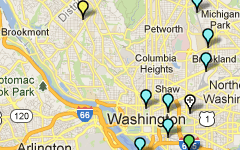Abilities-Ride Program: An Alternative to MetroAccess
In this guest post, Mr. Christiaan Blake, Director, WMATA Office of ADA Policy and Planning describes a new cost-cutting partnership called Abilities-Ride.
On September 30, the Washington Metropolitan Area Transit Authority (WMATA) issued a request for proposals (RFP) for its new Abilities-Ride program. Abilities-Ride is designed to provide MetroAccess–eligible customers with access to a general trip purpose alternative in the Prince George’s and Montgomery County sections of the MetroAccess service area. Depending on the results of the program, Abilities-Ride could be expanded to cover the entirety of the MetroAccess service area. Abilities-Ride will not be a Metro service, but instead a public-private partnership between Metro and one or more vendors that provide existing or soon-to-be established generally available on-demand service. Metro will subsidize up to $15 per eligible customer trip.
MetroAccess Sustainability
MetroAccess is the region’s designated paratransit service for people whose disabilities prevent them from using bus and/or rail services for at least some of their trips. As outlined in the Americans with Disabilities Act (ADA), paratransit services like MetroAccess were designed to be a safety net. However, in many places, including the Metro service region, demand for paratransit has grown at unsustainable rates. To address the growth in demand for MetroAccess, WMATA has been facilitating the availability of new alternative services among which MetroAccess customers could choose. The new alternatives include the Coordinated Alternatives to Paratransit Service (CAPS) pilot program for trips to/from human services agencies, and the highly successful TransportDC service that allows Washington, DC residents eligible for MetroAccess to call a cab for medical and work-related trips anywhere in DC for a flat, $5 fare.
In addition to providing customers with an improved travel experience, these alternatives can be provided at much lower costs on a per-trip basis than MetroAccess because these services are not required to maintain the administrative infrastructure of a designated paratransit provider.
Abilities-Ride Outline
Once the Abilities-Ride program is underway, MetroAccess customers will be able to use one or more transportation services for trips beginning and ending in Maryland they otherwise would have taken on MetroAccess. The trips will be the same day instead of requiring 24-hour notice, and if the customer chooses, they can be direct trips instead of shared rides. Customers will pay the first $5 of the fare, Metro will pay the next $15, and the customer will pay any remaining fare about $20. Customers will be limited to four Abilities-Ride subsidized trips per day.
To ensure the success of this program for all MetroAccess customers, WMATA has developed a plan that outlines specific accessibility requirements of all potential vendors. Those accessibility requirements include the ability to demonstrate the availability of wheelchair accessible vehicles; reservation systems that comply with Section 508 and WCAG 2.0 standards; and mandate the accommodation of customers traveling with service animals.
Potential vendors must outline their screening methods to ensure that all drivers meet applicable federal, state, and local requirements for safety and qualifications including background checks, driving records, and training with regard to serving customers with disabilities.
In addition to providing MetroAccess customers with more options, WMATA expects Abilities-Ride to produce significant cost savings—between $4 and $6 million in the first full year of the program.
Next Step
The RFP will remain open until November 9, 2016. WMATA will review all proposals and is expected to award a contract(s) at the end of January 2017. It is expected that customers will be able to take trips subsidized by the Abilities-Ride program beginning in March 2017.



Recent Comments